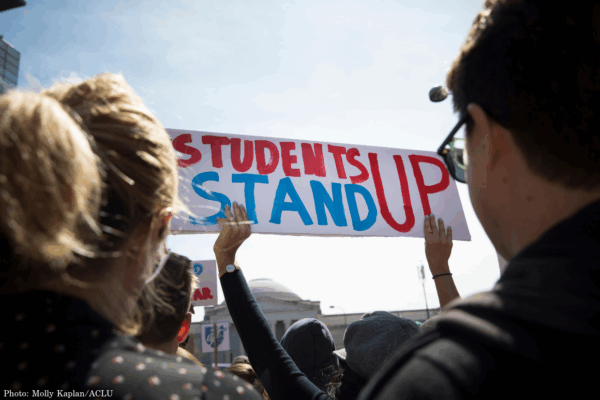By Jack Lohmann, Volunteer
It’s back to school time in the Commonwealth. So, we could think of no better time to highlight the role of students in securing our civil rights and liberties.
In my year working with the ACLU of Virginia, I’ve had the opportunity to delve into the stories of some inspiring students who stood up for what they believed was right and made history as a result. Students like Barbara Johns, who led the fight against separate and unequal schools in Virginia’s Prince Edward County; the Barnette sisters, whose religion prohibited them from reciting the Pledge of Allegiance at school; Adriel Arocha, whose long braids – that the school wanted to prevent him from wearing – reflected his religious beliefs; and an anonymous student in Lee County who asked the ACLU of Virginia to stop the school from including a religious hymn as part of the official graduation program.
Beyond courage, however, these students had something that many lack – knowledge of the constitutional rights that follow them through the door of the public schoolhouse.
James Madison wrote that the Constitution was designed to “protect the weak.” And, a student confronted by a school official often feels just that. Historical cases abound of frustrated students asserting their rights. Many of these students, rebuffed by their school districts or local governments, took their arguments all the way to the U.S. Supreme Court, winning crucial protections that to this day still guard students’ rights. Others achieved policy change without having to go to court.
In 1951 Barbara Johns was 16 and a student at Farmville’s all-black high school. Frustrated by the school’s lack of supplies, Johns advocated for her right to a proper education. After two weeks of protests, Johns sued the school board in a case that became part of Brown v. Board of Education. The Court’s unanimous opinion that “[s]eparate educational facilities are inherently unequal” sought to end once and for all the scourge of segregation in schools across the country.
When two West Virginia sisters were kicked out of school for staying true to their Jehovah’s Witness faith by refusing to recite the Pledge of Allegiance, they didn’t back down. Accused of “insubordination,” the Barnette sisters argued that they shouldn’t be forced to violate their personal beliefs by reciting the Pledge each day – and, in 1942, the U.S. Supreme Court agreed. Justice Robert Jackson wrote a sweeping opinion in support of the “freedom to differ,” praising dissent and assailing any repression thereof as “a mere shadow of freedom.”
Even the freedom of religious expression isn’t always safe in a school setting. In 2009, kindergartner Adriel Arocha was placed in indefinite suspension by his Texas school district for refusing to cut his hair, which was long as a part of his Apache faith. Instead of giving in to the school’s attack on his faith, Arocha and his parents (represented by the ACLU) fought back, gaining for students an expanded set of religious freedoms.
These cases continue to this day. A high school student in Lee County contacted the ACLU of Virginia in May of 2014, uncomfortable about the inclusion of a Christian hymn as part of the official graduation program. The inclusion of this hymn sent the message that the graduation was a Christian event and that if a student did not share those beliefs they did not belong. Once the school district was made aware of the student’s right to religious freedom, it agreed to remove the hymn from the program.
Such victories are crucial to preserving students’ rights. America has a strong tradition of social progress, and a deep history of rights won, lost, and regained. Every liberty remains a fight, every freedom a struggle. For students, understanding and embracing this struggle is crucial to preserving the victories of the past while continuing to win new freedoms and protections moving forward.
As ACLU founder Roger Baldwin put it: “Battles for civil liberties never stay won. They must be fought over and over again.” If there’s one thing I’ve learned at the ACLU of Virginia, it’s that everyone can fight those battles – and that anyone, well-equipped with an understanding of their rights, can win them.

